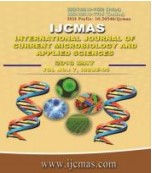


 National Academy of Agricultural Sciences (NAAS)
National Academy of Agricultural Sciences (NAAS)

|
PRINT ISSN : 2319-7692
Online ISSN : 2319-7706 Issues : 12 per year Publisher : Excellent Publishers Email : editorijcmas@gmail.com / submit@ijcmas.com Editor-in-chief: Dr.M.Prakash Index Copernicus ICV 2018: 95.39 NAAS RATING 2020: 5.38 |
Women have played a key role in protecting the soil health through organic recycling from ancient time. Poonch is one of the hilly, tribal, remote, and border districts of Jammu and Kashmir situated in the Pir Panjal range of the North-West Himalaya. The Gujjars and Bakarwals are significant ethnic groups of Poonch district. Gujjar-Bakarwal women are extremely rich in their indigenous knowledge and techniques. They are fully aware that regular recycling of organic wastes in the soil is the most efficient method of maintaining optimum levels of soil organic matter, but the traditional method of preparing and storing FYM followed by the Gujjar-Bakarwal women is faulty. To improve the quality and quantity of composts produced by them, address the issue of acute shortage of chemical fertilizers in the area, and to protect and maintain the soil health, KVK-Poonch initiated intervention of imparting vocational trainings to young Gujjar-Bakarwal girls on various aspects of composting techniques. The results are encouraging. Many of the KVK trained girls have set up vermicompost units at their respective villages and earning good income. KVK-Poonch is taking their services as Master Trainer to train more young girls of Gujjar-Bakarwal communities in an effective manner. The district had moved towards more effective maintenance of soil health.
 |
 |
 |
 |
 |